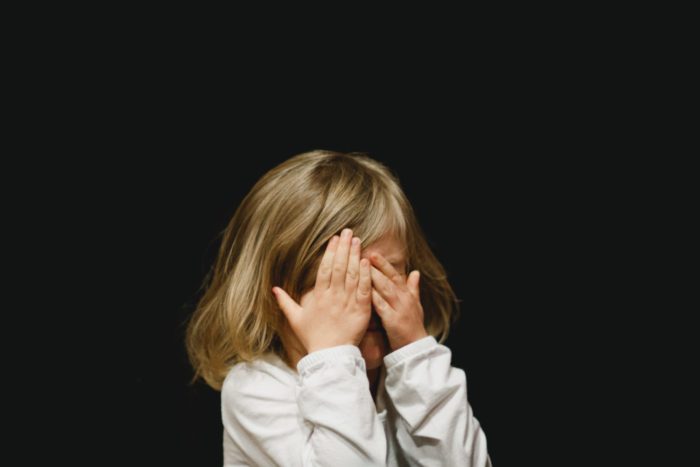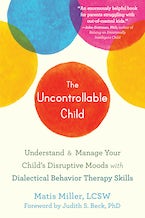By Matis Miller, LCSW, author of The Uncontrollable Child
Effective, Compassionate Parenting during a Pandemic Pandemic parenting is a challenge for all parents, even those blessed with angelic kids.
If you’re living with an “uncontrollable” child—one who’s emotionally sensitive, highly reactive, impulsive, or defiant—you passed “challenging” a long, long time ago.
Parenting these children is a struggle during uneventful times, and we’re living in times that are unquestionably eventful!
Every parent has dealt with a seemingly never-ending parade of changes over the past year—changes that have made us question everything we’ve ever known (or thought we’ve known) about ourselves, our children, and our parenting.
Some of the challenges and thoughts you’ve probably encountered include:
• He refuses to wear a mask, and it’s a battle every, single, day.
• They keep asking for more screen time and I’m so exhausted that I cave just to get some time to myself. When does “survival mode” end and “neglectful parent” begin?
• When my teen hangs out with friends, I know they’re not social distancing. Is it worth the fight?
• The kids fight constantly, and I’m so overwhelmed with remote schooling, work, stress, housework, and grief that I simply can’t follow through with consequences. I feel so guilty for not being able to get this under control.
• His anxiety is through the roof and he’s taking it out on all of us. He needs to get back to his in-school routine already; this situation is totally unsustainable!
• She just won’t stop complaining that she’s bored! Does she not notice that there’s a global pandemic going on?! This is way harder for me, but you don’t see me complaining.
• A bunch of states are back to normal, but there’s no end in sight here. I am so over this craziness; I can’t do it anymore.
Compound these challenges with out-of-control behaviors and age-inappropriate reactions, and boom! You’re living in a volatile environment.
It’s not your fault. It’s not your child’s fault. You’re doing your best—and you can probably do better. It may not be what you think, though! You may not need to work harder on being that parent that everyone envies. Even practicing self-acceptance and coming to terms with the situation can help. Drop the parent guilt (yes, really) and move your family into a healthier mindset with these evidence-based strategies.
Put your mask on first.
(Like the oxygen masks on airplanes. Remember air travel?)
It’s important to shift your frame of mind in order to shift your home’s atmosphere. First, work on accepting yourself. Sure, you’ve made mistakes and bad judgments, and you’re very far from alone in that. Even without in-person socializing, it’s easy to fall into the trap of “every other parent is doing this better than me,” and judge yourself harshly.
Validate yourself and give yourself a pat on the back! Remember that this is tough for everyone and that your thoughts, emotions, behaviors, and challenges are normal.
Embrace change
While our younger kids may not even remember a time without masks and social distancing, we sure do—and it can be painful to pine for the normalcy that we once took for granted. Take a moment (or several) to reflect on and grieve for the past, then mindfully reflect on the changes that you’ve made and even embraced over the last year—even when you would’ve preferred different circumstances.
Change is the only true constant in our lives, and recognizing that things have changed can make it easier to look forward to additional change. Make a conscious decision to live in the moment, because who really knows what will change next? It’s easy to get trapped in hopeless feelings of “this is my life now and it’s never going to change,” so knowing that change is constant and inevitable can be comforting and heartening.
Examine your balance
Parenting is all about balance, and the balance of consistency and flexibility—when to give in, when to negotiate, and when to stand firm—is a biggie. Then along comes COVID-19 and upsets that balance. Virtually everything that was once a comfortable and consistent routine—bedtime, screen time, schoolwork expectations, even dress code—is now up in the air.
While we’d like to cling to any semblance of normalcy, from date nights to daily schedules, in the reality of 2021 we need to adjust those balances and expectations. When the winds of change threaten our precarious balance, it’s time to recalibrate. Determine what’s truly most important and how your family’s structure has changed so that you can find your new balancing point (and be prepared to adjust it again!).
Bonus: this teaches your rigid children how to be flexible, too, and how to consistently enforce what really matters. When they see that you’re open to the reality and willing to change, they may be more cooperative.
Relinquish control
Not completely, but COVID-19 has taught us that we simply cannot control everything. Look at your child’s behaviors that you’ve deemed “unacceptable” or “uncontrollable,” and decide which ones you can stop controlling (at least for now). You may need to look the other way and accept some of those unacceptable behaviors (like extra screen time or increased fighting) to preserve your sanity and your relationship with your child. And yes, take some time to acknowledge your feelings—sadness, anxiety, frustration, helplessness—that accompany this step, and watching your child make decisions that you don’t support.
See their side
As aggravating, immature, stubborn, or unrealistic your child’s viewpoint may seem, there’s always a “kernel of truth” in every perspective. Dig deep to find his or her truth (masks hurt my ears or I want to give my friend a hug or I’m devastated that I can’t have a prom, even though way more devastating things are happening). Think about what your child must deal with and how it would have affected you at that age.
It’s easy to fall into the “should” trap: he should be able to understand why we’re doing this; she should have adjusted by now; she should deal with it and move forward already. Know this: “should” is a judgment. Try to avoid it! Focus on what is, or what can be, rather than what should be.
Think positive
We’re living in fairly dark times. Don’t underestimate the power of praise and positive reinforcement, especially when you’re spending all day with your kids and your very last nerve is stretched to its breaking point; when it’s so easy to get caught up in the overwhelming negativity, it’s more important than ever to insert positivity. A simple, “you’re pretty awesome for wearing that mask, even adults are having trouble with that!” can go a long way in dispelling the gloom—and encouraging them to continue wearing their masks.
Matis Miller, LCSW, is a licensed clinical social worker, and certified cognitive and dialectical behavior therapist with more than fifteen years of experience. He is founder, director, and supervisor of The Center for Cognitive & Behavioral Therapy of New Jersey. His educational and training background includes certification in cognitive behavioral therapy (CBT) from the Academy of Cognitive Therapy, and intensive training at the Beck Institute for Cognitive Behavior Therapy. Miller has also been awarded certification from the DBT-Linehan Board of Certification in dialectical behavior therapy (DBT). He is a seasoned lecturer on CBT- and DBT-related topics—addressing parents, clients, and professionals—and is presently focused primarily on supervision, education, and consultations.



 2024 Peace Playbook: 3 Tactics to Avoid Clashes with Your Partner
2024 Peace Playbook: 3 Tactics to Avoid Clashes with Your Partner